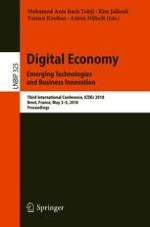2018 | OriginalPaper | Chapter
E-Learning Effectiveness: A Survey in Two Tunisian Higher Education Establishments Using an Educational Platform
Author : Rabeb Mbarek
Published in: Digital Economy. Emerging Technologies and Business Innovation
Publisher: Springer International Publishing
Activate our intelligent search to find suitable subject content or patents.
Select sections of text to find matching patents with Artificial Intelligence. powered by
Select sections of text to find additional relevant content using AI-assisted search. powered by
